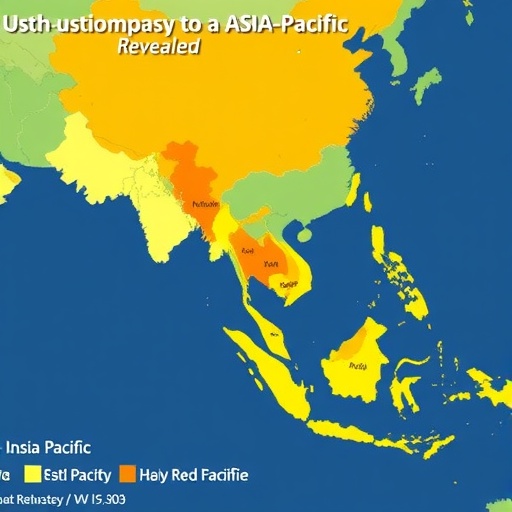The growing prevalence of obesity across the Asia-Pacific region is not just a public health concern; it represents a multifaceted challenge that intertwines clinical, humanistic, and economic ramifications. A systematic literature review recently unveiled by Artime, Zimner-Rapuch, Chen, and their colleagues examines the diverse implications of adult obesity in this diverse and economically significant area. The findings illuminate how obesity not only increases health risks but also compromises quality of life and places substantial pressure on healthcare systems.
Obesity, defined primarily by body mass index (BMI), manifests not only as a physical health statistic but also as a complex interplay of social, psychological, and environmental factors. As the review highlights, obesity’s rise in the Asia-Pacific context is particularly alarming, given the cultural nuances and economic disparities within the region. Various studies collectively indicate that obesity prevalence continues to grow, affecting millions and contributing to an array of chronic diseases like diabetes, heart disease, and certain cancers, all of which pose a significant burden on health resources.
In recent years, lifestyle changes, urbanization, and the increased prevalence of processed foods have exacerbated obesity rates. Traditional purchasing behaviors have shifted toward convenience to accommodate modern lifestyles, while sedentary habits are notably more common due to a plethora of screen-based entertainment options. These changes have profound implications, not only for individual health but also for national healthcare policies as they attempt to combat the escalating obesity epidemic.
Moreover, the psychological and emotional aspects of obesity are increasingly receiving attention. Higher rates of discrimination and stigma faced by individuals with obesity can lead to mental health issues, including depression and anxiety. The literature review underscores this aspect, revealing how societal perceptions of body image can worsen the burden on individuals struggling with their weight. Such research calls for initiating comprehensive strategies focused on changing societal attitudes toward obesity, thus fostering a more inclusive community that can support individuals in their path to better health.
Healthcare systems in the Asia-Pacific region are already grappling with the fallout of this obesity crisis. Increased prevalence leads to higher costs associated with treating obesity-related conditions, often diverting resources from other critical areas of healthcare. The review points out that the economic impact extends to productivity losses, with employees dealing with obesity suffering higher levels of absenteeism and reduced performance at work. Such findings necessitate multi-sector collaboration to create sustainable solutions that not only address health but also bolster economic productivity.
As health systems work to respond to the obesity crisis, there is a pressing need to overhaul public health messaging. According to the review, initiatives must shift from merely educating about healthy eating and exercise to incorporating culturally relevant strategies that resonate with the local populace. Effective communication should evolve, embracing not only clinical guidelines but also emotional and behavioral insights that can inspire change on a community level.
In terms of intervention strategies, the literature review advocates for comprehensive approaches that integrate physical activity, nutrition education, and community engagement. Programs focusing on behavior modification, fostering healthier food environments, and promoting active lifestyles have shown promise in reducing obesity rates in several pilot studies. Furthermore, utilizing technology, such as mobile health applications and telehealth solutions, provides an innovative avenue to enhance access to resources for individuals managing obesity.
Another critical aspect highlighted is the importance of policy-making in tackling obesity within the Asia-Pacific context. Governments must prioritize regulations that restrict unhealthy food marketing, especially those aimed at children, while also incentivizing the production and consumption of healthier food options. Incorporating obesity prevention strategies into public health agendas not only signifies a commitment to health but also showcases a proactive approach toward securing better outcomes for future generations.
The findings from this systematic review clearly reveal that addressing obesity within the Asia-Pacific region is an urgent priority that cannot be ignored. Collectively, the studies underscore the complexity of obesity as a condition that warrants a nuanced response, involving healthcare professionals, policymakers, industry leaders, and community members. Only through a holistic understanding and collaborative efforts can we hope to make significant strides in mitigating the impact of obesity on public health.
In conclusion, the systematic literature review conducted by Artime and colleagues presents a clarion call for action against the rising tide of obesity in Asia-Pacific. With extensive research illuminating the intricate web of challenges presented by this epidemic, it is evident that no single entity can tackle the problem alone. The time for concerted effort is now, as the stakes for individual health, societal equity, and economic stability continue to rise with every passing year.
As nations grapple with the ramifications of adult obesity, there lies an opportunity for transformation in how health is perceived, managed, and improved. The investments made today can help forge a healthier, more resilient Asia-Pacific, capable of overcoming the pressing challenge of obesity and paving the way for a thriving future.
Subject of Research: Adult Obesity in Asia-Pacific
Article Title: Clinical and Humanistic Burden of Adult Obesity in Asia–Pacific: A Systematic Literature Review
Article References:
Artime, E., Zimner-Rapuch, S., Chen, R. et al. Clinical and Humanistic Burden of Adult Obesity in Asia–Pacific: A Systematic Literature Review. Adv Ther (2025). https://doi.org/10.1007/s12325-025-03324-2
Image Credits: AI Generated
DOI: 10.1007/s12325-025-03324-2
Keywords: Obesity, Asia-Pacific, Public Health, Healthcare Systems, Economic Burden, Mental Health, Prevention Strategies.




